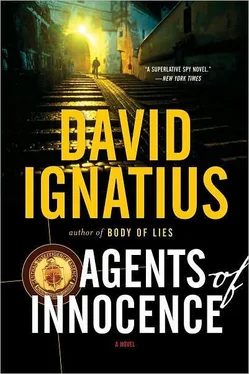David Ignatius - Agents of Innocence
Здесь есть возможность читать онлайн «David Ignatius - Agents of Innocence» весь текст электронной книги совершенно бесплатно (целиком полную версию без сокращений). В некоторых случаях можно слушать аудио, скачать через торрент в формате fb2 и присутствует краткое содержание. Жанр: Шпионский детектив, на английском языке. Описание произведения, (предисловие) а так же отзывы посетителей доступны на портале библиотеки ЛибКат.
- Название:Agents of Innocence
- Автор:
- Жанр:
- Год:неизвестен
- ISBN:нет данных
- Рейтинг книги:3 / 5. Голосов: 1
-
Избранное:Добавить в избранное
- Отзывы:
-
Ваша оценка:
- 60
- 1
- 2
- 3
- 4
- 5
Agents of Innocence: краткое содержание, описание и аннотация
Предлагаем к чтению аннотацию, описание, краткое содержание или предисловие (зависит от того, что написал сам автор книги «Agents of Innocence»). Если вы не нашли необходимую информацию о книге — напишите в комментариях, мы постараемся отыскать её.
Agents of Innocence — читать онлайн бесплатно полную книгу (весь текст) целиком
Ниже представлен текст книги, разбитый по страницам. Система сохранения места последней прочитанной страницы, позволяет с удобством читать онлайн бесплатно книгу «Agents of Innocence», без необходимости каждый раз заново искать на чём Вы остановились. Поставьте закладку, и сможете в любой момент перейти на страницу, на которой закончили чтение.
Интервал:
Закладка:
“How is my old friend Frank Hoffman?” asked Stone after the two had eaten their steaks and drunk most of the wine.
“I didn’t know you were friends,” said Rogers. He found such a friendship hard to imagine.
“Yes indeed,” said Stone. “Frank saved me once from making a very bad mistake in Europe. I am still grateful to him.”
“What was the mistake?” asked Rogers.
“The details are a little fuzzy now,” said Stone. Like many CIA officers, he had a selective memory. He could recall with precision the specific facts that were required to deal with the problem at hand, and forget everything else.
“Tell me,” pressed Rogers. “I’d like to know.”
“We were in Germany together after the war,” explained Stone. “Frank was my security man. He had switched over not long before to CIA from the FBI.”
“So he really was in the FBI.”
“Oh yes. Didn’t you know? That’s why he makes such a point of wearing a gun.”
“He doesn’t talk much about his past, at least not to me,” said Rogers. “What happened in Germany?”
“We were trying to reconstruct some of the Abwehr networks in Eastern Europe. The Germans had had an especially good fellow in Prague. We managed to get him to the West for a chat. Hoffman and I spent an evening with him.
“I came away very impressed. He was an immensely clever man, who had wide contacts and appeared to despise the Russians. He seemed like a good bet to me. But Hoffman didn’t like him.”
“Why?”
“He wouldn’t really say at first. He just kept repeating that the agent didn’t smell right. Finally he explained that he thought the Czech agent was unreliable because he was unpatriotic. Any Czech who had worked for the Nazis was a dubious character, Hoffman claimed. If he had betrayed his own people once, to work for the Germans, then he could just as easily betray us. I disagreed. I thought we could use him for our purposes.”
“Who was right?”
“Hoffman, of course. The Czech was a bad apple. Because of Frank’s concern, we didn’t use him for any sensitive operations. But we kept him on the payroll for a year or so, until we learned from a KGB defector who had served in Prague that this same Czech had made a pass at them. We were very lucky. The whole thing could have been disastrous. Hoffman refused to take any credit. He said it had just been a lucky guess.”
Rogers pondered the story and deliberated a moment before asking his question.
“What would happen today?” Rogers asked cautiously.
“What do you mean?” queried Stone.
“What would happen today if someone objected to an operation because it didn’t smell right?”
“Ahhhh,” said Stone. “A good question. In all probability he would be called home immediately, for consultations.”
Rogers wasn’t sure whether Stone was joking.
“Times have changed,” said Stone. “The small and inexperienced organization that Hoffman and I joined doesn’t really exist anymore. It has been replaced by a bureaucracy, quite a large one, with its own rules and rhythms. In the old days it was possible to trust one’s instincts and hunches, because we didn’t really have anything else to go on. There was no body of cases and experience to draw on. Today there is.
“The sad part,” continued Stone, “is that it doesn’t do any good to regret the changes. It’s like regretting the passing of time. As organizations grow, they change in character. They develop their own systems and routines. A bureaucratic culture emerges, with rewards for people who play by the rules and punishments for those who don’t.”
“Unfortunate,” said Rogers.
“Unfortunate, but inevitable. This is the life cycle of a bureaucracy. Supple in youth. Rigid in middle age. Weak and decaying in old age. Organizations are like any other sort of animal. Their strongest instinct is to survive and reproduce themselves. It may be that the problems are greater in a secret organization like ours, where the bureaucratic culture is sealed off from the outside. But they aren’t fundamentally different.”
“What do you suggest?” asked Rogers.
“Take risks. Lean against the wind,” said Stone. “Listen to correct advice and ignore incorrect advice.”
“How do you know the difference?”
“Let us order dessert, shall we?” said Stone.
When the dessert dishes had been cleared, Stone finally got down to business. He led Rogers to a small private room on the third floor, ordered two brandies from the waiter, and closed the door. He offered Rogers a cigar-a Cohiba, Castro’s brand, smuggled from Cuba-and lit one for himself. It was a signal that the serious part of the evening was about to begin.
“I regard you as the ablest case officer we have in the Middle East at present,” Stone began warmly. “I also regard you as a kindred spirit and an example of what is best in our business. For these reasons, I very much want you to succeed in your current operation.
“The course of action you are proposing is unorthodox, as our friend Mr. Marsh took such pains to demonstrate this morning.”
Stone raised his eyebrow slightly when he mentioned the name, as if to say that he, too, found his operations officer a bit of an ass.
“Without endorsing Marsh’s conclusions, I think it’s important that you understand why he spoke as he did about control. He was right. Control is the soul of what we do. Perhaps you recall the passage in King Lear where Edgar observes that ‘Ripeness is all’?”
Rogers nodded yes.
“Well, in our business, we might well say: ‘Control is all.’ Control of ourselves and others.
“Let me tell you a brief story that will illustrate my point. It is about one of our illustrious British ancestors in the SIS, Commander Mansfield Cumming, the man who first took the designation of ‘C.’ He has come to be regarded as an eccentric, an oddball who signed his correspondance in green ink and tapped absent-mindedly on his wooden leg.”
“His wooden leg?”
Stone nodded and continued.
“ ‘C’ rarely told people how he had lost that leg, but the tale was recounted years after his death in a friend’s memoir. One day in 1915 in France, the old man and his son were taking a drive. Their car hit a tree and overturned, mortally wounding the boy and pinning ‘C’ by the leg. The father heard his son’s cries for help, but he could not free himself from under the wreckage of the car to help the boy. In desperation, he took out his pocket knife and hacked at his leg-his own leg-until he had cut it clean off.”
“With a knife?”
“With a pocket knife. Then he attended to his dying son.”
Rogers took a deep breath. Stone took a drink from his snifter of brandy.
“I think of that remarkable story of courage and self-discipline whenever I consider the requirement for control in intelligence operations. We must control ourselves-and to the extent possible, our agents-as completely and cold-bloodedly as ‘C’ did that day.”
Stone drained his brandy glass and rang for another round. When it arrived, he closed the door firmly and settled back into his chair. He turned to the next stage of his argument, as neatly as if he was turning over a card in a game of blackjack.
“Control is not the only virtue, however,” said Stone with a smile. “Reliability is also essential, and it isn’t the same thing as control. I think some of our ‘purists’ often forget this distinction.
“Let me give you an example. In this business we have to deal with a spectrum of people…” Stone spread out his hands wide in front of him-“…from the man over here who refuses to work for you until you force him to cooperate, to the man over there who talks to you because he is your friend and he trusts you. You ‘control’ the first and not the second. But which one is more reliable?”
Читать дальшеИнтервал:
Закладка:
Похожие книги на «Agents of Innocence»
Представляем Вашему вниманию похожие книги на «Agents of Innocence» списком для выбора. Мы отобрали схожую по названию и смыслу литературу в надежде предоставить читателям больше вариантов отыскать новые, интересные, ещё непрочитанные произведения.
Обсуждение, отзывы о книге «Agents of Innocence» и просто собственные мнения читателей. Оставьте ваши комментарии, напишите, что Вы думаете о произведении, его смысле или главных героях. Укажите что конкретно понравилось, а что нет, и почему Вы так считаете.












